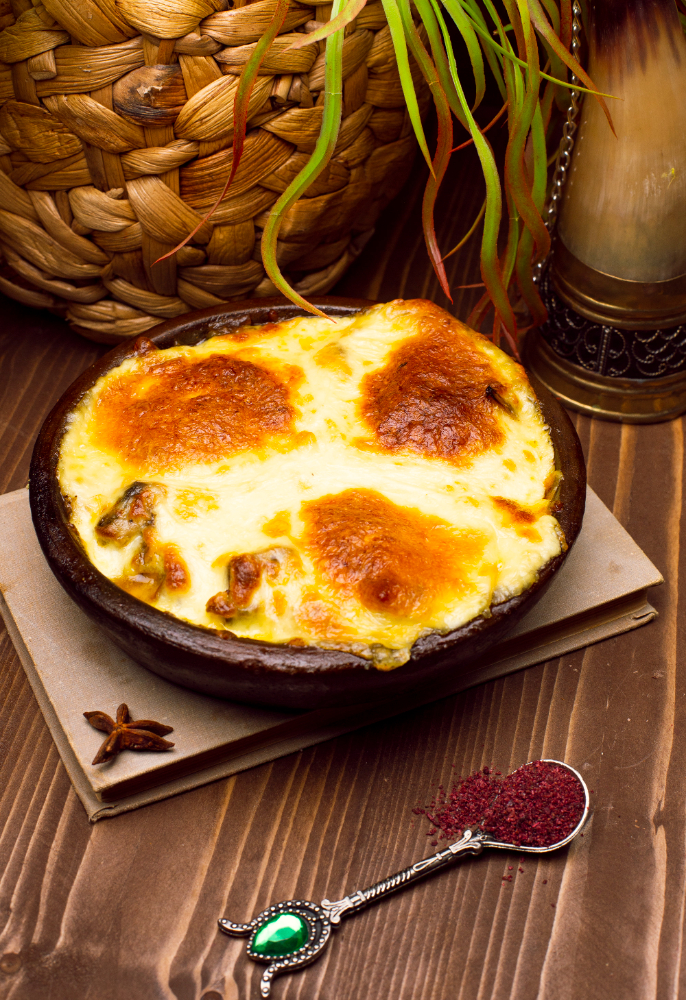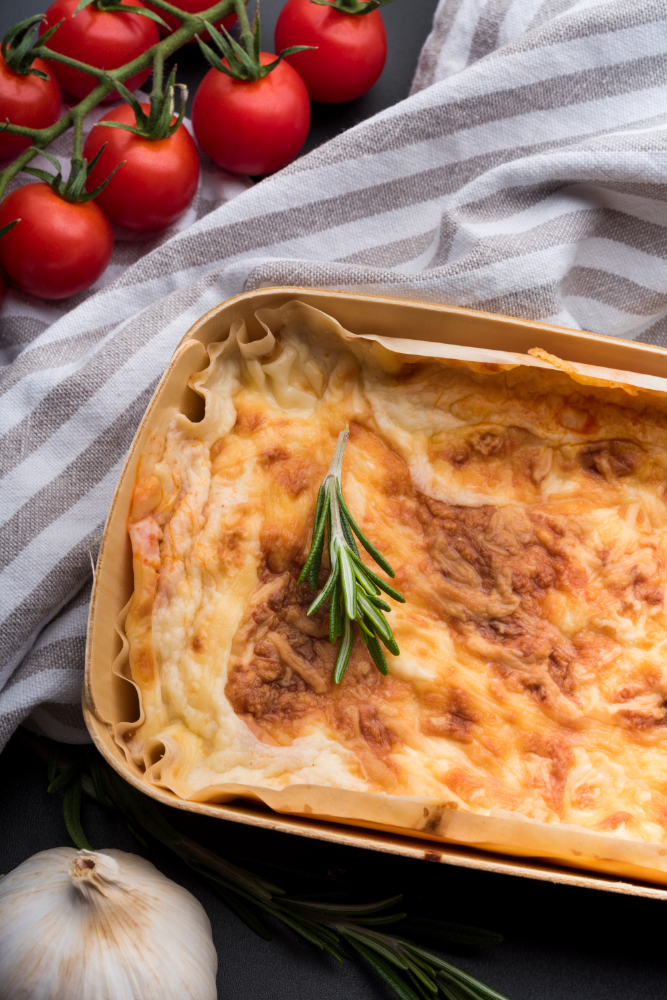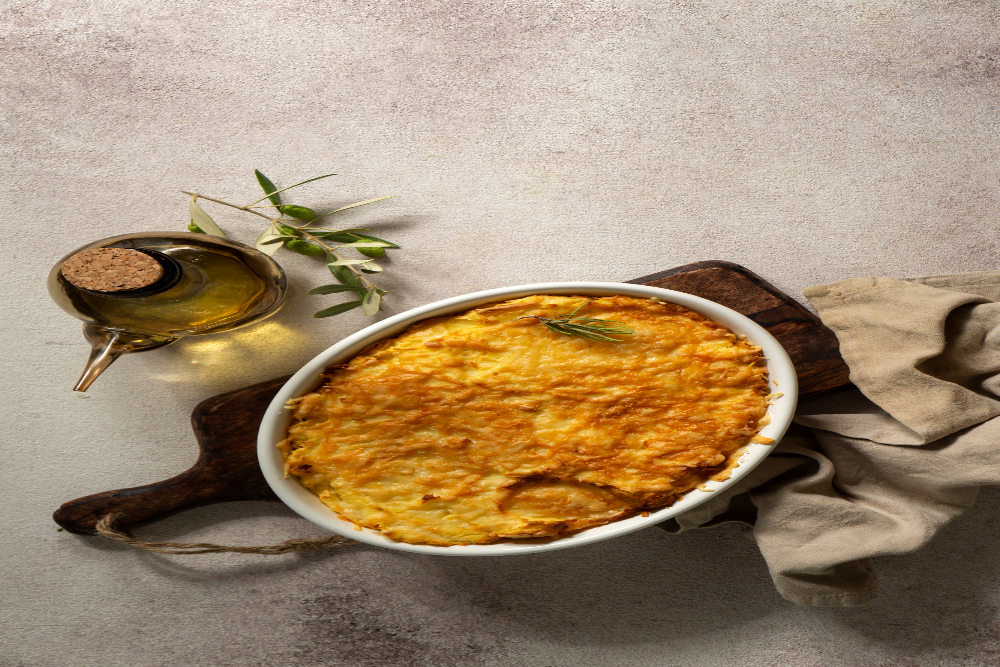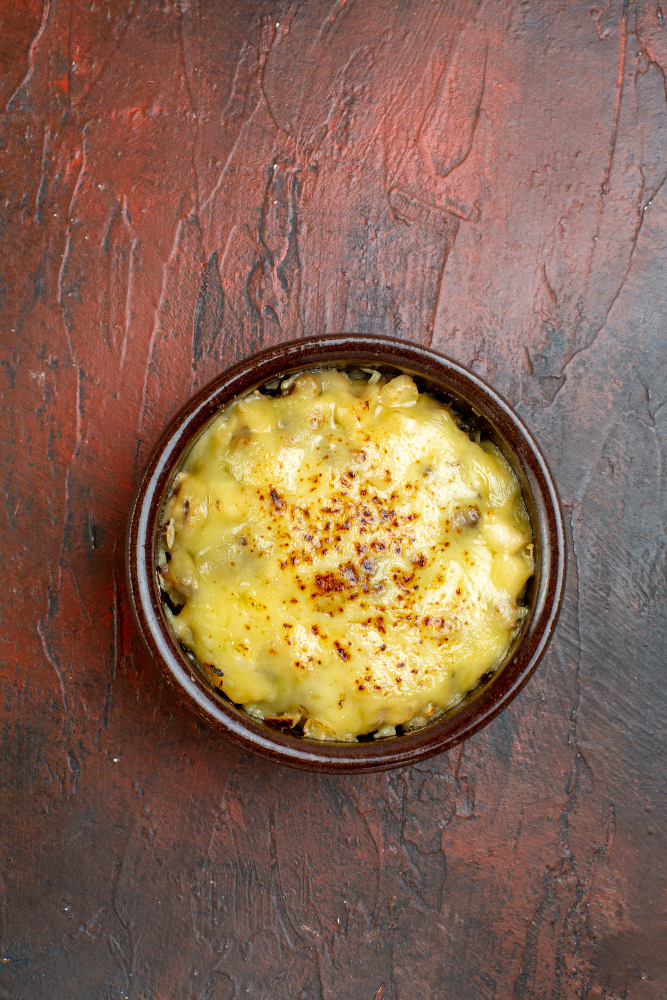
Shepherd's pie, a culinary treasure, is a quintessential comfort food that warms the heart and delights the palate. This beloved dish combines layers of flavorful minced meat, traditionally lamb, with a luscious blanket of creamy mashed potatoes. Baked to golden perfection, it epitomizes the harmonious union of rustic simplicity and culinary excellence.
The journey begins with tender minced lamb, sautéed to perfection with aromatic onions, garlic, and a medley of herbs and spices. This culinary dance infuses the meat with rich flavors, creating a savory filling that is the soul of the shepherd's pie.
On top of this culinary masterpiece lies a crown of fluffy mashed potatoes, crafted with precision and care. Creamy and velvety, the mashed potatoes provide a luxurious layer that balances the robustness of the meat, creating a symphony of textures and flavors in each delectable bite.
As the shepherd's pie bakes in the oven, the aroma fills the kitchen, captivating your senses and building anticipation. The result is a culinary triumph—a golden crust that conceals a medley of savory wonders, mingling flavors and bringing comfort like a warm embrace.
Shepherd's pie is a dish that transcends boundaries and time, bringing families and friends together to savor its homely charm. It is a culinary legacy that celebrates humble ingredients transformed into something extraordinary—a true testament to the artistry of traditional cooking.
Whether enjoyed on a cozy winter evening or as a nostalgic reminder of home, shepherd's pie remains a culinary masterpiece, cherished for its simplicity, heartiness, and the unforgettable pleasure it brings to every culinary adventurer fortunate enough to experience its comforting embrace.

Unleash Your Culinary Creativity with a Distinctive Twist on Shepherd's Pie
Step into the realm of culinary innovation as we reimagine the beloved classic, shepherd's pie, in a way that will tantalize your taste buds and set your creation apart from the rest. Prepare to embark on a culinary adventure like no other, infusing this comforting dish with unique flavors and techniques that will leave a lasting impression.
Ingredients:
For the Filling:
1.5 pounds minced lamb (or alternative meat of your choice)
1 large onion, finely chopped
3 cloves of garlic, minced
2 carrots, finely diced
1 cup frozen peas
2 tablespoons tomato paste
1 cup beef or vegetable broth
1 tablespoon Worcestershire sauce
1 teaspoon dried rosemary
1 teaspoon dried thyme
Salt and pepper, to taste
Culinary twist: Add a splash of red wine or a sprinkle of cinnamon for a unique flavor profile.
For the Mashed Potato Topping:
4 large potatoes, peeled and cubed
1/2 cup milk or cream
4 tablespoons butter
Salt and pepper, to taste
Culinary twist: Infuse the mashed potatoes with a roasted garlic puree or blend in grated Parmesan cheese for an extra layer of flavor.

Instructions:
1-In a large skillet or pot, heat a drizzle of oil over medium heat. Add the minced lamb (or alternative meat) and cook until browned. Remove the meat from the skillet and set aside.
2-In the same skillet, sauté the chopped onion, minced garlic, and diced carrots until they soften and caramelize slightly. Add the cooked meat back into the skillet.
3-Stir in the tomato paste, beef or vegetable broth, Worcestershire sauce, dried rosemary, dried thyme, and the culinary twist of your choice. Season with salt and pepper to taste. Simmer the filling mixture for about 10-15 minutes, allowing the flavors to meld together. Stir in the frozen peas during the last few minutes of cooking.
4-Meanwhile, bring a pot of salted water to a boil. Add the peeled and cubed potatoes and cook until tender. Drain the potatoes and return them to the pot.
5-Add the milk or cream, butter, salt, and pepper to the pot with the cooked potatoes. Mash the potatoes until smooth and creamy. Incorporate your chosen culinary twist, such as a roasted garlic puree or grated Parmesan cheese, to elevate the mashed potato topping.
6-Preheat your oven to 400°F (200°C). Transfer the meat filling into a baking dish and spread the mashed potato topping evenly over the filling. Use a fork to create decorative patterns on the surface.
7-Bake the shepherd's pie for approximately 25-30 minutes, or until the mashed potato topping turns golden and slightly crispy.
8-Allow the shepherd's pie to cool for a few minutes before serving. This will allow the flavors to settle and intensify.
9-As you present your distinctive shepherd's pie to the world, savor the anticipation of tasting a creation that showcases your culinary artistry. Each spoonful will transport you to new flavor dimensions, where tradition intertwines with innovation, and the boundaries of culinary excellence are pushed. Enjoy the satisfaction of knowing that your shepherd's pie is a truly distinctive masterpiece that stands out amidst the sea of traditional renditions.
calories in the Filling:
1.5 pounds minced lamb (or alternative meat of your choice):
- Calories: Approximately 1560 calories
- Protein: Approximately 112 grams
- Fat: Approximately 122 grams
- Carbohydrates: Negligible
1 large onion, finely chopped:
- Calories: Approximately 60 calories
- Protein: Approximately 2 grams
- Fat: Negligible
- Carbohydrates: Approximately 14 grams
3 cloves of garlic, minced:
- Calories: Approximately 13 calories
- Protein: Approximately 0.6 grams
- Fat: Negligible
- Carbohydrates: Approximately 3 grams
2 carrots, finely diced:
- Calories: Approximately 50 calories
- Protein: Approximately 1 gram
- Fat: Negligible
- Carbohydrates: Approximately 12 grams
1 cup frozen peas:
- Calories: Approximately 62 calories
- Protein: Approximately 4 grams
- Fat: Negligible
- Carbohydrates: Approximately 12 grams
2 tablespoons tomato paste:
- Calories: Approximately 30 calories
- Protein: Approximately 1 gram
- Fat: Negligible
- Carbohydrates: Approximately 7 grams
1 cup beef or vegetable broth:
- Calories: Approximately 10-20 calories (depending on the type of broth)
- Protein: Approximately 1-2 grams
- Fat: Negligible
- Carbohydrates: Approximately 1-2 grams
1 tablespoon Worcestershire sauce:
- Calories: Approximately 15 calories
- Protein: Negligible
- Fat: Negligible
- Carbohydrates: Approximately 4 grams
1 teaspoon dried rosemary:
- Calories: Approximately 3 calories
- Protein: Negligible
- Fat: Negligible
- Carbohydrates: Approximately 1 gram
1 teaspoon dried thyme:
- Calories: Approximately 3 calories
- Protein: Negligible
- Fat: Negligible
- Carbohydrates: Approximately 1 gram
Salt and pepper, to taste:
- Calories: Negligible
- Protein: Negligible
- Fat: Negligible
- Carbohydrates: Negligible

claories in the Mashed Potato Topping:
1/2 cup milk or cream:
- Calories: Approximately 120-150 calories (depending on the type of milk or cream)
- Protein: Approximately 4-8 grams
- Fat: Approximately 6-12 grams
- Carbohydrates: Approximately 9-12 grams
4 tablespoons butter:
- Calories: Approximately 400-400 calories
- Protein: Negligible
- Fat: Approximately 44-48 grams
- Carbohydrates: Negligible
Salt and pepper, to taste:
- Calories: Negligible
- Protein: Negligible
- Fat: Negligible
- Carbohydrates: Negligible
Culinary twist options:
Roasted garlic puree:
- Calories: Approximately 45-60 calories (depending on the amount used)
- Protein: Approximately 1-2 grams
- Fat: Negligible
- Carbohydrates: Approximately 10-12 grams
Grated Parmesan cheese:
- Calories: Approximately 40-60 calories (depending on the amount used)
- Protein: Approximately 3-4 grams
- Fat: Approximately 2-4 grams
- Carbohydrates: Approximately 1-2 grams


Comments